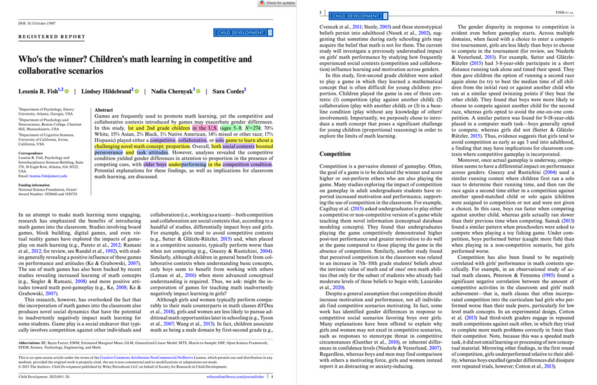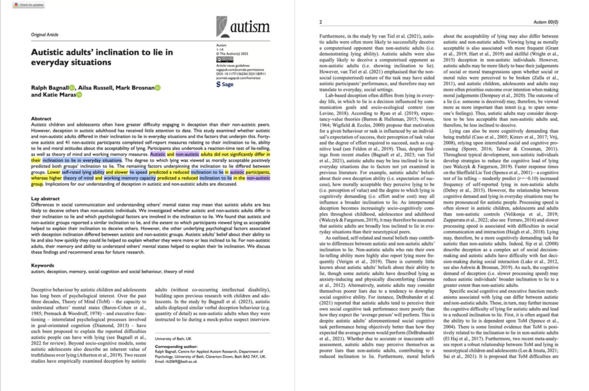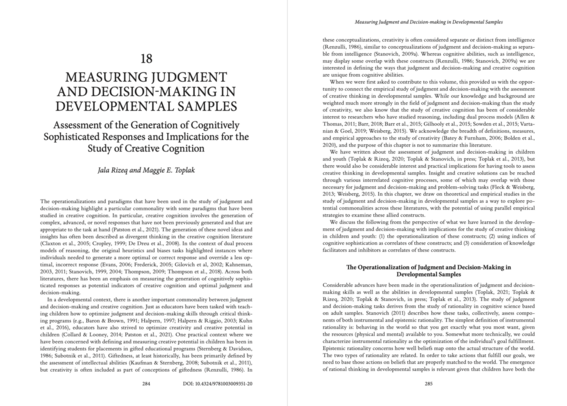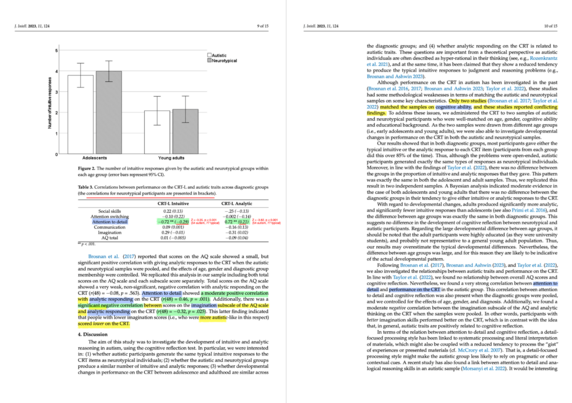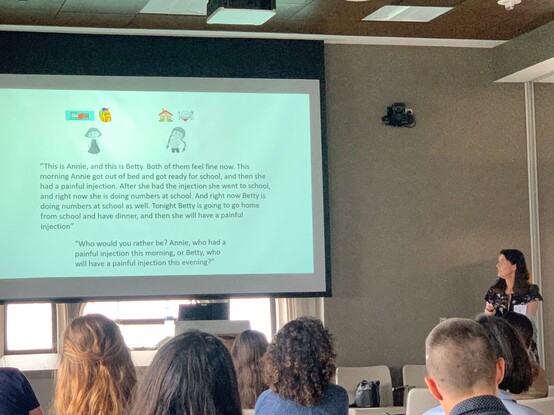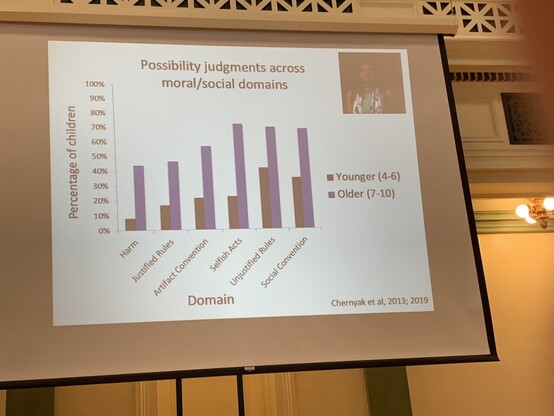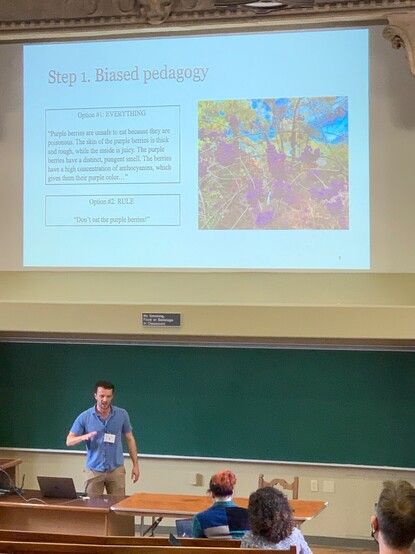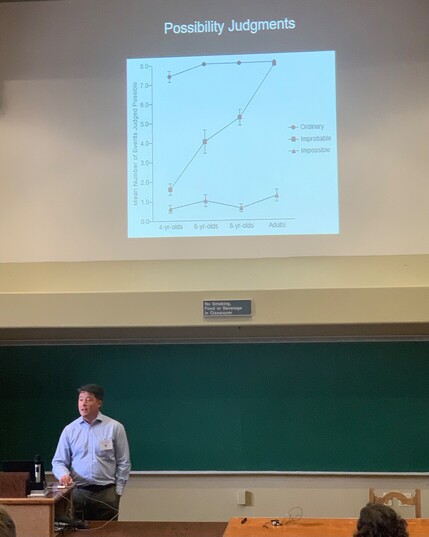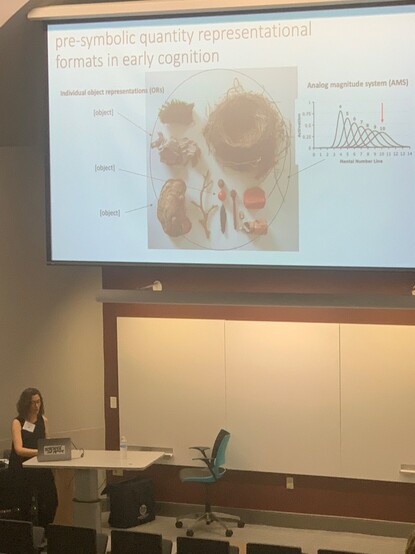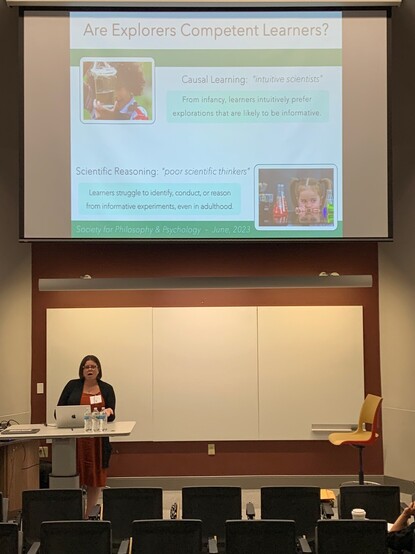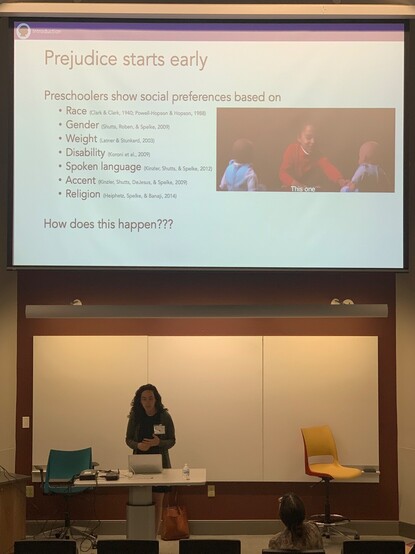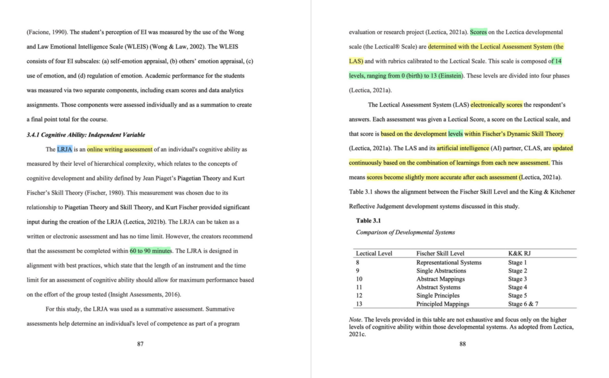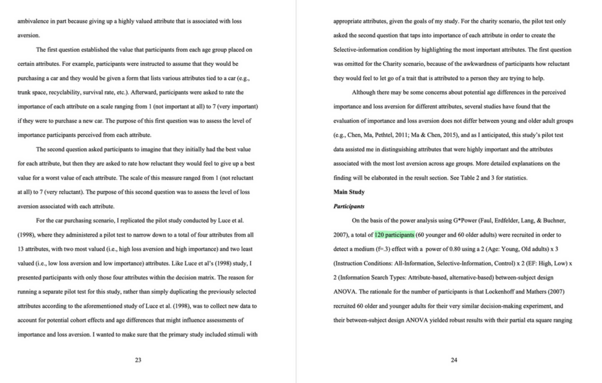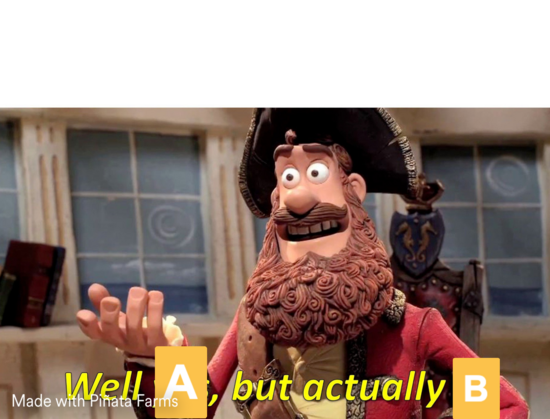Nick Byrd · @ByrdNick
924 followers · 562 posts · Server nerdculture.deDo you expect #kids to learn #math better alone, collaboratively, or competitively?
In a study of 274 1st and 2nd graders, it varied by gender (and not how I would have expected).
Boys performed better after working alone or collaboratively, but didn’t seem to benefit from competition.
On the harder tasks, girls benefitted *only* from competition.
#kids #math #edu #school #teaching #DevPsych #numeracy #decisionscience
Nick Byrd · @ByrdNick
910 followers · 548 posts · Server nerdculture.deAutistic adults weren't more likely to report lying in everyday situations than non-autistic adults (p - 0.259).
Age and theory of mind predicted fewer lies from non-autistic adults, but not autistics adults.
Lie acceptability predicted more lies in both groups.
#DevPsych #ethics #autism #asd #moralpsych #xPhi
Nick Byrd · @ByrdNick
903 followers · 536 posts · Server nerdculture.deWill high school students' reflection test performance predict the reasoning preferences and habits it does in adults?
Rizek and Toplak report "patterns of correlations are generally consistent with what has been reported in adult samples" in a sample of over 300 9th through 12 graders from North America:
#decisionscience #DevPsych #psychology #replicability
Nick Byrd · @ByrdNick
823 followers · 456 posts · Server nerdculture.de(2/2) ...autistic people's “attention to detail” Autism Quotient subscores *strongly* predicted more reflection—significantly more than neurotypical participants' scores!
(z-scores mine)
These results of better matching help explain why scientists *sometimes* find a correlation between #autism and #reflection test performance: #attention to detail?
Find the free paper in Journal of #intelligence https://doi.org/10.3390/jintelligence11060124
#autism #reflection #attention #intelligence #psychology #rationality #decisionscience #DevPsych #edu
Nick Byrd · @ByrdNick
823 followers · 453 posts · Server nerdculture.deTeresa McCormack closed the #SPP2023 #preconference on #memory with “The value of remembering and anticipating experiences: a developmental perspective”
It was—as Teresa put it—dangerously close to an #xPhi talk. It adapted a famous thought experiment (from Derek Parfit?) to test kids’ and adults’ intuitions about how much we care about past, present, or future versions of us.
Follow Dr. McCormack on gScholar: https://scholar.google.com/citations?user=g9T7yn8AAAAJ&hl=en&oi=ao
#spp2023 #preconference #memory #xPhi #personalidentity #philmind #psychology #DevPsych #p4c
Nick Byrd · @ByrdNick
821 followers · 447 posts · Server nerdculture.deTamar Kushnir’s #SPP2023 presidential address tried to answer, “When do children become responsible for moral decisions?”
Evidence suggests people’s opinions vary by culture, as do laws, but there’s evidence that kids develop the ability to understand moral aspects of decisions (including that some decisions seem to be moral).
Find/follow Dr. Kushnir on gScholar: https://scholar.google.com/citations?user=TMuSMXoAAAAJ&hl=en
#spp2023 #DevPsych #ethics #philmind #cogsci #xPhi
Nick Byrd · @ByrdNick
821 followers · 445 posts · Server nerdculture.de“Norm Emergence from Cognitive Biases and Cultural Transmission” presented by Scott Partington
Three experiments suggest that people
- Infer impermissibility from imprudence
- that impermissibility can be retained
Why care? Cuz we see biased pedagogy that caused this deontic inference in many developmental contexts (like teaching and parenting).
Collaborators: Rachana Kamtekar, Shaun Nichols
Scott’s on gScholar: https://scholar.google.com/citations?user=jAq0UGIAAAAJ&hl=en&oi=ao
#DevPsych #xPhi #ethics #teaching #cogsci #spp2023
Nick Byrd · @ByrdNick
821 followers · 443 posts · Server nerdculture.deAndrew Shtulman'w “Reflecting on Possibility: Cognitive Reflection Facilitates the Development of Modal Cognition" replicated and extended finding that kinds think wrong actions are improbable, are improbable events are wrong!
Kids’ reflection test performance predicted kids possibility and permissibility judgments (above and beyond age and executive function).
Follow on gScholar to learn when article is up: https://scholar.google.com/citations?user=Cz8bTrkAAAAJ&hl=en&oi=ao
#cogSci #decisionScience #DevPsych #ethics #probability #xPhi
#cogsci #decisionscience #DevPsych #ethics #probability #xPhi
Nick Byrd · @ByrdNick
821 followers · 435 posts · Server nerdculture.deMelissa Kibbe shared “Function Arithmetic Computations Over Pre-Symbolic Representations of Quantity in Infants and Children” at #SPP2023:
Research with Cheng empirically distinguished nonsymbolic arithmetic (noticing one physical object is placed next to another) from symbolic arithmetic (1+1=2) are algorithmically distinct, which may limit transfer from nonsymbolic arithmetic formal math.
Find/follow Dr. Kibbe on gScholar: https://scholar.google.com/citations?user=NN4GKo8AAAAJ&hl=en
#spp2023 #DevPsych #math #xPhi #cogsci #philmind
Nick Byrd · @ByrdNick
821 followers · 424 posts · Server nerdculture.deCaren Walker presented "Children Consider Future Learning Goals During Information Search" with/for Liz Lapidow (who was sick, absent).
Puzzle: evidence is mixed about whether kids are "intuitive scientists" or bad at scientific thinking (controlling for variables).
Modified task suggested kids *can be* intuitive scientists when the task dissociates different goals that kids might have during the task.
Paper on gScholar: https://scholar.google.com/scholar?oi=bibs&hl=en&cluster=18137361289857062215
#DevPsych #cogsci #philsci #philmind #causation
Nick Byrd · @ByrdNick
818 followers · 414 posts · Server nerdculture.deRebecca Peretz-Lange (and colleagues') shared results and theory about why #essentialism frames can sometimes promote and sometimes mitigate #prejudice.
Dr. Peretz-Lange appeals to studies that included both kids and adults to suggest that "causal discounting" can make the seemingly contradictory results coherent.
You can find/follow the publications from Rebecca's gScholar page: https://scholar.google.com/citations?view_op=list_works&hl=en&hl=en&user=C14WR0gAAAAJ&sortby=pubdate
#bias #devPsych #framingEffects #decisionScience #biology #behavior
#essentialism #prejudice #bias #DevPsych #framingeffects #decisionscience #biology #behavior
Nick Byrd · @ByrdNick
759 followers · 244 posts · Server nerdculture.deAutomated scoring of reflective thinking in accounting students' writing "positively related to data analytics assignment grades [but] #emotionalIntelligence (EI) was not found to moderate th[is] relationship" (N = 86).
Images of pages from the thesis are attached: https://udallas-ir.tdl.org/handle/20.500.14026/2064
#CriticalThinking #Emotion #EmotionalIntelligence #EQ #NaturalLanguageProcessing #NLP #TextAnalysis #DevelopmentalPsychology #DevPsych #Teaching #Education #DataAnalysis
#emotionalintelligence #criticalthinking #emotion #eq #naturallanguageprocessing #nlp #textanalysis #developmentalpsychology #DevPsych #teaching #education #dataanalysis
Nick Byrd · @ByrdNick
758 followers · 242 posts · Server nerdculture.deOlder people (over 55) were less prone to a certain type of #deliberation during #buying and #donation #decisions—even though they were more ambivalent (and #ambivalence correlated with more deliberation) and even when controlling for working #memory—than younger people (18-24). Total N = 120.
Images of pages from the article are attached: https://ir.ua.edu/handle/123456789/9902
#age #CriticalThinking #DecisionScience #JudgmentAndDecisionMaking #JDM #DevelopmentalPsychology #DevPsych #Psychology #CogSci
#deliberation #buying #donation #decisions #Ambivalence #memory #age #criticalthinking #decisionscience #judgmentanddecisionmaking #jdm #developmentalpsychology #DevPsych #psychology #cogsci
Nick Byrd · @ByrdNick
752 followers · 227 posts · Server nerdculture.de"children [with] more #conservative" parents were more likely to "cho[o]se boys and girls with extreme stereotypical features (e.g., the girl in head-to-toe pink) as [more] representative and informative of their categories"
Video abstract (4 minutes): https://www.youtube.com/watch?v=Ps9BwuukyD0
Paper: https://doi.org/10.1111/desc.13345
#Stereotypes #Gender #Politics #Children #Parenting #DevelopmentalPsychology #DevPsych #Learning
#conservative #stereotypes #gender #politics #children #parenting #developmentalpsychology #DevPsych #learning
Dr Alex Barraclough-Brady · @alexbbrady
13 followers · 22 posts · Server mastodonapp.ukWhen you understand the object still exists, but get caught out looking in the wrong place for it #devpsych
Benny deMayo · @bennydemayo
76 followers · 14 posts · Server sfba.socialNew review paper out, in which Ashley Jordan, Kristina Olson and I synthesize several decades of work on gender development in gender diverse children #DevPsych #GenderDiverse
https://www.annualreviews.org/doi/abs/10.1146/annurev-devpsych-121020-034014
Benny deMayo · @bennydemayo
76 followers · 14 posts · Server sfba.socialQuestion for #DevPsych #CogSci friends:
What's a fun example in the research literature of kids not being able to explain their own thought process or giving wildly unreliable or off-topic verbal reports relating to something they just did?
(e.g., I'm thinking of things like the foundational work of Flavell and colleagues, Monographs of SRCD 1995.)
Dr Suzy J Styles · @suzyjstyles
471 followers · 154 posts · Server toot.communityOnline study for native English speaking kids 5-7 on creativity and video games shared by @thaliagoldstein
#DevPsych #StudyBoost
Munna R S | മുന്നാ | मुन्ना · @munnarshainy
1 followers · 2 posts · Server mastodon.lolHeyo! 👋
I am an aspiring #devpsych #PhD student interested in studying #brain behind #morality in #infants and #children. I look forward to understanding morality from the lens of #emotions, #relationships and #memories through #play.
I am currently a Research Assistant at Stanford University and @manybabies .
Feel free to head to my website for more information about me! 😁
#introduction #introductions #DevPsych #phd #brain #morality #infants #children #emotions #relationships #memories #play
Michael Frank · @mcxfrank
956 followers · 32 posts · Server nerdculture.deRT @DrMeltemYucel@twitter.com
Great news for developmentalists! Also tracks with my personal experience doing studies both online and in person. #psychology #devpsych https://twitter.com/mcxfrank/status/1592691366454505474
🐦🔗: https://twitter.com/DrMeltemYucel/status/1592709519943282689
